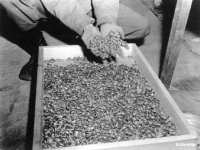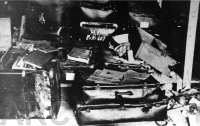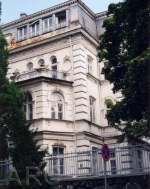Georg Wippern was born on
26 May 1909 in
Hildesheim, and during his service in
Lublin,
was a crucial figure in the organised plunder of the Jewish victims of
Aktion Reinhard.
One of his post-war statements best sums up his role in
Lublin during WW2:
"
In my capacity as leader of the SS-garrison administration
(Standortverwaltung)
Lublin, I received an order in
spring 1942 from the leader of the Main Economic Administration in
Berlin,
Oswald Pohl, to take charge of and sort out all jewellery, valuables and foreign
currency and other money confiscated from Jews and to maintain their correct delivery.
Accumulated jewellery and valuables, as well as foreign currency, were delivered to the
Central Economic Administration
(WVHA) in Berlin and then to
the Reichsbank in Berlin on receipt. Jewellery was melted down, if the
design was not of special value, and then delivered to the Reichsbank as gold bars. The same happened with silver.
Local currency, Polish Zloty, was transferred by my office at the Emissionsbank in
Lublin to an account at the Reichsbank."
In the early days of
Aktion Reinhard,
Christian Wirth delivered the
confiscated jewellery and valuables from the Jews directly to the
Reichsbank in an unsatisfactory manner.
After the order from
Pohl,
Wirth had to
hand over the valuables to
Wippern.
 |
| Dental Gold |
 |
| Chopin Street Depot |
Wippern’s sorting and processing unit was known as
Abteilung Reinhard
and
Abteilung 1Va. Two senior SS-men were assigned to
Wippern,
Unterscharführer Eicholz and
Dorl,
who worked at different times with a small Jewish workforce of between 20-30 people. They were involved in the
sorting and storing of the high value possessions removed from hundreds of thousands of Jewish families. In addition,
Wippern had assigned to him trained banking personnel,
SS-Obersturmführer Huber,
SS-Oberscharführer
Teichelmann and
Rzepa, as well as an
SS-Unterscharführer Pflanzer.
Wippern’s special depot was located in a large five–storey building at
27 Chopin Straße, near the centre of
Lublin. Items were sorted, cleaned and stored on huge shelves by 20 Jews
brought from the nearby Jewish Labour Camp on
Lipowa Straße.
A
report by
SS-Sturmbannführer
Albert Franke-Gricksch mentions the depot at
Chopin Straße:
"
From
Trawniki we travelled back to
Lublin to inspect the special enterprise REINHARD.
This branch has had the task of realising all mobile Jewish property in the Generalgouvernement.
It is astonishing what immense fortunes the Jews have collected in their ghetto
and even ragged and vermin infested dirty little Jews who look like beggars, carry with them,
when you strip their clothes off them, foreign currency, pieces of gold, diamonds and other
valuables. We wandered through the cellars of this "special enterprise" and we were
reminded of the fairy tales of the "Arabian Nights".
 |
Wippern's Office at
the Standortverwaltung |
Whole boxes full of genuine pearls, cases full of diamonds, a basket full of pieces of gold
and many kilos of silver coins, beside jewellery of every kind. In order to carry out a better
realisation of all these valuables, the gold and silver are melted into bars. We inspected
the melting process in the garden of the house. There is a small foundry where gold and
silver are melted and then formed into bars and delivered to the German National Bank
on certain days. 'Special Enterprise REINHARD' has so far delivered 2,500 kilos of gold,
20,000 kilos of silver, 6.5 kilos of platinum, 60,000 Reichsmark in currency, 800,000
dollars in money and 144,000 gold dollars. The huge quantity of diamonds and pearls
can hardly be evaluated."
Wippern’s offices were located in adjoining buildings on the corner of the
Pilsudski Allee and
Lipowa Straße. The sorting depot at the
Airfield Camp on
Chelmska Street, which was used
as the central clearing depot for the substantial quantities of clothing from the Jewish victims
of the
Aktion Reinhard death camps, was also under his administration.
Wippern was ordered by
Odilo Globocnik to equip the
Belzec and
Sobibor personnel with SS uniforms.
Wippern stated:
"The
SS- und Polizeiführer Lublin,
Globocnik, had already
requested from me the fitting-out
of 40 men who had come from the
Reich. At that time nothing had been said about a Jewish
resettlement.
Globocnik, ordered me to fit-out these men. They were an
SS–Sonderkommando, sent from
Berlin."
After the war Wippern was employed as a lower-grade civil servant. Together with his family he often moved, and lived in
different towns:
Saarbrücken, Hannover, Aachen, Bad Dürrheim, Homburg
(Jägersburg) and Bonn. These moves may have taken place for good reasons. German authorities
showed a new interest in Nazi crimes during and after the
Eichmann trial.
His children didn't know about his activities in
Lublin. His
granddaughter describes him as an intelligent and well educated man with good manners who had always been an
affectionate grandfather. He often woke up in the night, troubled by nightmares. At such times he told his wife that he
dreamed of battles (he had an old gunshot wound in his shoulder). Perhaps this could be an indication that his job
in
Lublin didn't necessarily correspond to his character. In
1942 he visited
Majdanek several times. Afterwards he returned home, became nervous and
overwrought and had a permanently pale demeanour. German investigative officials questioned him after the war. No
proceedings were commenced and he was never tried. This could be put down to the fact that he hadn't committed any crime
in a narrower sense, but had been employed solely as chief of administration of department 1Va. So he might be a typical
example of a "writing desk" offender.
In
spring 1993 Wippern died in
Bonn.
© ARC 2005









